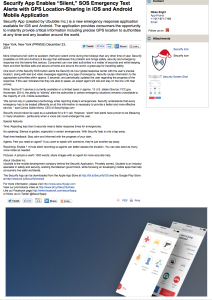|
|
|
– See more at: https://app-promo.com/clients/case-history-sobrr-inc/#sthash.j3iTQrxq.dpuf
|
|
|
– See more at: https://app-promo.com/clients/case-history-sobrr-inc/#sthash.j3iTQrxq.dpuf
Posted by Michael Siliski, Product Management Director, Google Play
Google Play now reaches more than 1 billion people on Android devices in more than 190 countries, helping a growing number of developers like you build successful global businesses. In fact, in the past year, we paid more than $7 billion to developers distributing apps and games on Google Play. We remain as committed as ever to making Google Play the best place to find great apps, games and other entertainment.
App discovery plays a critical role in driving your continued success, and over the past year Google has provided bestpractices to enhance app discovery and engagement, as well as app promotion tools to get the most out of search and display advertising for developers. We are always looking for new ways to help you get your apps in front of potential new users. That’s why, in the next few weeks, we will begin piloting sponsored search results on Google Play, bringing our unique expertise in search ads to the store.
With more than 100 billion searches every month on Google.com, we’ve seen how search ads shown next to organic search results on Google.com can significantly improve content discovery for users and advertisers, both large and small. Search ads on Google Play will enable developers to drive more awareness of their apps and provide consumers new ways to discover apps that they otherwise might have missed.
In the coming weeks, a limited set of users will begin to see ads from a pilot group of advertisers who are already running Google search ads for their apps. We’ll have more to share in the coming months about the expansion of this program as we look at the results and feedback. We believe search ads will be a useful addition to Google Play for users and developers alike, and we hope this will bring even more success to our developer community.
|
|||||||||||||||||||||||||||||||
Google’s decision to ban user testimonials from app descriptions in the Google Play store could make certain aspects of app discovery more difficult. (Image source: Google Play screen shot)
Perhaps Crest did it best when it kept it simple with that old claim that four out of five dentists recommended its toothpaste. It’s not the way we normally think of testimonials, but companies have long used glowing comments from customers in some way that get reproduced on websites, including blurbs from critics plastered on movie posters and book jackets.
Android apps, at least in Google’s view, should be considered a different beast altogether.
In a recent change to its Google Play store developer guidelines, the company suggested there were too many times when what was supposed to be honest validation of an app or mobile game seemed more like an exercise in manipulative app store optimization.
“Please do not include user testimonials in your app description. They tend to be dubious and are frequently utilized to include references to popular search terms and competitor apps in violation of the policies outlined here,” Google noted under the “Keyword Spam” section of its Play policies and procedures. “Let your users speak for themselves via Play’s comment review system.”
According to experts in the marketing of Android apps, Google’s decision won’t put any developers out of business overnight, but it could make certain aspects of discovery and driving installs more difficult.
“It’s a reasonable request,” said Jeff Hughes, who published a book called Android Apps Marketing. “Testimonials are an effective way to promote a product but Google is asking developers not to place them in the app description because they can’t be verified and in some cases developers are using certain keywords found in other similar apps so that their own apps will be found in a search. Google, like Apple, is trying to ensure a more level playing field for all app developers.”
According to Tom Cummings, client accounts director at app marketing firm Fiksu, users are already well-conditioned to look at the reviews section to see what other “real” people think.
“App developers should use their descriptions to highlight what their apps do, provide meaningful updates, and outline key features and benefits,” he said. “App developers that give more time and attention to user feedback and reviews, when improving their apps, are most likely to improve their actual ratings.”
Value of testimonials varies
Dave Bell, co-founder and CEO of Gummicube, advises a range of clients on marketing app strategies. He said the value of user testimonials varies largely based on the type of application.
“For most consumer applications, the typical user behavior is to check out a couple of the most recent reviews posted of the current version of the app and base their decision on those comments,” he said. “When you are marketing an app with a more complicated value proposition (for example, like a business application) testimonials can be particularly useful.”
Like testimonials, reviews are always an important factor in the organic discovery and download of an application, said Gary Yentin, CEO and co-founder of App-Promo.
“However, that said, people tend to look at reviews as an aggregate and hence look at the sum of all the reviews for the application in the review section, so removing the one or two from Google Play will not make much of an impact,” he said. “The best form of app marketing is organic and social where people refer the app to their friends. This is still the most powerful and most viable form for app marketing.”
Bell, however, said good app store optimization (ASO), which has become a bigger topic in mobile circles over the last year, is far from an attempt to fool consumers.
“With millions of apps in the marketplace, the app stores are becoming more and more like the Internet and today 70 percent of all downloads are actually coming from search,” he said. “Even when you look at paid marketing channels, having an understanding of organic user demand and user behavior inside the app stores can help developers design advertising/promotional campaigns that have higher conversion and better returns.”
The historical challenge with ASO, Bell added, is that nearly all of the keyword tools in the marketplace simply pipe in data from Google Web Search or the Google Keyword Planner. “Unfortunately, there is very little overlap between web search behavior and mobile search behavior in the app stores–so finding a partner with the right dataset is extremely important,” he said. Gummicube is focusing on aggregating this kind of data and leveraging it for its clients.
Apple had similar concerns
This issue is by no means isolated to Google. Several years ago, Hughes pointed out, Apple stopped allowing reviews by those who received a free download code from the developer. Apple had a similar concern, that the reviews from free downloads would naturally be tilted in the app’s favor.
“I would also draw a distinction between copying a review from iTunes, which may be less desirable or have less value, versus including an added-value testimonial like providing a snippet of a review from a magazine or website,” he said, adding that while it’s possible that Apple may implement similar policies, it is likely that it will pursue an agenda to guard its specific ecosystem, “which isn’t really the same ‘under the hood’ as Google Play.”
Cummings agreed. “The one exception would be testimonials included from major publications or reputable reviewers,” he said, citing online journals such as Lifehacker, “but even then it may cause the app description to be rejected. Developers will have to decide on a case-by-case basis if the endorsement is worth the risk of delaying approval.”
Google’s decision doesn’t necessarily mean developers should avoid testimonials, especially if they are legit, Hughes said. The Play store isn’t the only place to post them. “By all means use testimonials on your app’s website if you have one… and you should,” he said, noting some developers lack even basic ways to be found online. “Cross marketing between apps from the same developer is also another way to gain more exposure for your app.”
This article appeared in Fierce Developer on Jan 12th, 2015 –
@Apppromo kicked off #CES2015 with a great panel discussion @Appnation. The CXO Roundtable brought together top CEO’s from leading companies including, @Zumobi @urbanairship @traitify. The panel was moderated by @Apppromo’s partner @appannie. Stay tuned for more exciting insights from @Apppromo this year!
 |
|
|||||||||||
|
|||||||||||
|
|||||||||||
|
|
|
|||||||||
|
||||




New York, New York (PRWEB) December 23, 2014
 More Americans fall victim to accident, theft and violent crime during the holidays than any other time of year. Securify (available on iOS and Android) is the app that addresses this problem and brings safety, security and emergency response into the twenty-first century. Consumers can now alert authorities in a matter of seconds and while keeping them and their families safe and secure at home and around the world- a great app for travelling safely.
More Americans fall victim to accident, theft and violent crime during the holidays than any other time of year. Securify (available on iOS and Android) is the app that addresses this problem and brings safety, security and emergency response into the twenty-first century. Consumers can now alert authorities in a matter of seconds and while keeping them and their families safe and secure at home and around the world- a great app for travelling safely.
One touch of the Securify SOS button alerts the Securify 24-hour global response center with the user’s precise location, along with text and video messages regarding any type of emergency. Securify routes information to the appropriate authorities within approx. 5 seconds, and periodically updates the user regarding the progress of the response. If the user indicates that they are able to speak, an expert agent will call and stay on the line until help arrives.
While Text-to-911 service is currently available on a limited basis in approx. 12 U.S. states (Source: FCC.gov, November, 2014), the ability to “silently” alert the authorities in certain emergency situations remains unavailable to the majority of U.S. mobile subscribers.
“We cannot rely on yesterday’s technology while reporting today’s emergencies. Securify understands that every emergency has to be treated differently so all this information is necessary to provide a better and more effective service. “ said Carlos Gotlib Micha, CEO of SecurifyApp.com
Securify should never be used as a substitute for a 911 call. However, “silent” text alerts have proven to be lifesaving in many situations – particularly when a voice call could endanger the user.
Special features:
Time: Reporting less than 5 seconds means faster response times for emergencies.
No speaking: Silence is golden, especially in certain emergencies. With Securify help is only a tap away.
Real-time feedback: Stay calm and informed with the progress of your alert.
Agents: Feel you need an agent? If you want to speak with someone, they’re just another tap away.
Recording: Enable 1 minute silent recording so agents can better assess the situation. You can also send as many voice notes as needed.
Pictures: A picture is worth 1000 words; share images with an agent for more accurate help.
About Ububble Inc.
Ububble is the mobile development company behind the Securify Application. Privately owned, Ububble is an industry specialist in safety and security, working the Mexican government, while focusing on developing mobile apps that help consumers live safer worldwide.
The Securify App can be downloaded from the Apple App Store at http://bit.ly/SecurifyIOS and the Google Play Store at http://www.bit.ly/SecurifyAndroid
For more information, please visit http://www.securifyapp.com
View our promotional video at http://www.bit.ly/SecurifyVideo
Like our Facebook page http://www.facebook.com/securifyapp
Follow us on Twitter @Securifyapp

App-Promo and Tapped Mobile have survived the madness of CES 2015 and are pleased to present a curated half day morning session on Thursday January 16th at the TIFF- Bell Lightbox, recapping CES 2015 with a panel of the top digital executives in Canada discussing implications from CES and insights into how they see the year ahead unfolding.
Enjoy a cup of coffee, light breakfast, and come in from the cold to warm up with Mobile Insights 2015.
Event Overview
8:30 Registration, Networking, Coffee and Light Breakfast
9:00 Welcome and Opening Comments.
Jed Schneiderman, CEO TappedMobile
Gary Yentin, CEO App-Promo
9:15-9:30 CES 2015 Wrap Up
9:30-10:00 Agency Insights
Jake Norman, CEO Mindshare Canada
Bruce Neve, CEO Starcom MediaVest
Will Pate, VP Digital Strategy, M2 Universal
Matt Di Paolo, Managing Director Digital Innovation, Sidlee
Moderated by Jed Schneiderman, TappedMobile
10:00-10:30 Brand Insights
Jonathan Dunn, Associate Director Sales Marketing, Bell Digital Media
Rahul Raj, VP Marketing of Ecobee
Mark Childs, Chief Marketing Officer, Samsung
Moderated by Gary Yentin, App-Promo
10:30-10:45 Mobile Personas 2015
Mark Baltazar, Vice President, Brandspark International
10:45-11:00 Recap and Questions and Answers
Registration Information
Registration is limited to the first 100 registrations and is free for qualified agencies, brands and digital innovators. Simply click on bit.ly/Mobileinsights2015 to register